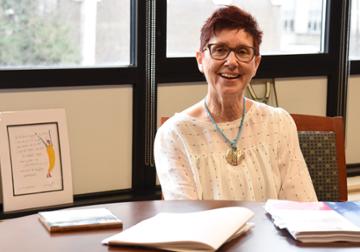In a significant step toward advancing genomic-informed care, Nursing Professor Dr. Becky Kronk has been invited to co-chair a national consortium focused on improving genomic literacy among health care providers.
The Inter-Society Coordinating Committee for Practitioner Education in Genomics (ISCC-PEG)
is a critical component of the National Human Genome Research Institute (NHGRI), which
is housed at the National Institutes of Health. A volunteer-based, interdisciplinary
community of professionals, the Committee’s mission is to integrate genomics education
into the practices of doctors, nurses and other health care providers.

“Genomics has an undeniable impact across all areas of health care,” said Kronk, an expert in genomics and nursing, medicine and health sciences disabilities education. “Our goal is for genomics to become a standard consideration in patient care—something that’s approachable and fully integrated.”
Genomics is the study of all of an individual’s genes (the genome), including the interactions of those genes with each other and with the individual’s environment, according to the NHGRI.
“There is no part of health care untouched by genetics,” Kronk explained. “Years ago, genetics was viewed as a specialty, but now, genetic and environmental factors influence areas like heart disease, diabetes and more. It’s critical that health care providers understand and integrate these components.”
Kronk’s involvement with the Committee stems from when she was pursuing a grant from the NHGRI that focuses on educating nurses about genomics and its impact.
“I wanted to apply for an NHGRI R25 grant, and in conversations with program officers, they introduced me to this committee,” she said. “I joined a few subgroups, including those focused on nursing and rare diseases. Before long, I was deeply involved and contributing in several capacities.”
In her role as external co-chair, Kronk oversees various aspects of the consortium’s work, including a scholars program, several productive subgroups and multiple working groups.
“We oversee a lot of interprofessional work, and every working group is very productive,” Kronk said. “It’s a substantial responsibility, but it’s rewarding to help shape genomic-informed care for future health care professionals.”
News Information


